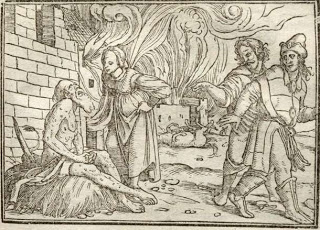I remember a conversation I had over a decade ago with a friend of mine about the book of proverbs compared to the book of Job. We were sitting at a Burger King and wrestling with how it could be that the book of Job could be included in the Bible along with the book of Proverbs. The two of them seem to be fighting with one another.
Let me explain. In the book of Proverbs there is a series of aphorisms that discuss the relative merits of living a good and moral life. According to Proverbs if you seek God, follow wisdom, work hard, avoid temptation, and act justly you will have a life that is full, long, and blessed.
In Job there is another perspective at work. They show a man that is the paradigm of virtue in Proverbs. One would expect him to have a good, full, and blessed life. However, this man, named Job, suffers a great deal of misfortune. He is covered in boils. His children are all killed. His property is stolen. He is left with nothing.
If one were to come up to Job and read him the book of proverbs it would not be unreasonable for Job to laugh at it’s pages outright.
This issue becomes more complex when you look at the book of Psalms.
In Psalms the poets express widely divergent expressions of human life. At times God seems like a close friend who will defend the righteous. At other times God is a far off deity that is presented at aloof and uncaring.
Sometimes both of these themes show up in the same Psalm! (look at Psalm 28)
Some have argued that all of this divergence and conflict is because the theological world view that underlies the psalms radically differs from that behind the wisdom literature.They believe that some authors of the Bible viewed God in completely different ways.
I think that’s too easy.
Some of the most interesting writing in the Bible comes out of the moments where paradox abounds. One might argue that the Psalms find their deepest power in places where they don’t resolve and the reader is left with a dangling question that infects their minds.
I like having the wisdom literature alongside Psalms because it makes the actual canon of scripture speak with a form of parallelism. The deep truth of God can’t be found in a single verse, chapter, or even in a book. God is found in the beauty of the tension between genres. God shows up in the process of trying to resolve the unresolvable.
In other words the canon is a sacred conversation that is never complete, and requires that we participate in the questions raised if the scripture is ever going to have real power.
Good questions reflect God much better then easy answers.
I don’t think the biblical authors have a radically different theology. All the books of the Bible declare that it is best to live life in a way connected to THE LORD. They simply are honest with how messy that can be.













